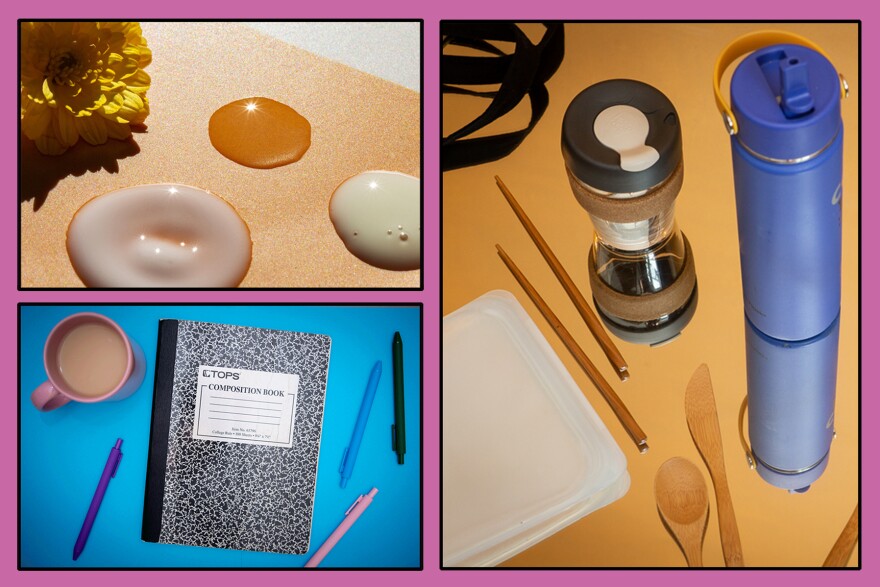At Life Kit, our job is to get great advice from health, lifestyle, finance and relationship experts and share them with our audience. Naturally, your producers and editors are going to have some favorite pearls of wisdom.
Here are 24 helpful tips from our episodes that we loved and really stuck with us this past year. They include practical guidance (like wear sunscreen and eat more fiber!) and a few surprising ones too (treat bread like dessert and use your washing machine's express cycle!). We hope they'll help you save money and time and boost your health and happiness this year.
For more fresh ideas on how to improve your life in 2024, check out our New Year's Resolution Planner.
1. If a task takes less than two minutes, just do it right then and there. It's not worth the effort to write it down, remember it and do it.
2. Expose yourself to sunlight first thing in the morning to trick your body into feeling more alert. Sunlight helps regulate your internal clock by curbing a sleep-regulating hormone called melatonin. If you live somewhere where it's dark in the mornings, use a broad-spectrum light box to simulate sunlight.
3. Brush your teeth before you eat breakfast. The acid from food softens the enamel, so brushing too soon after eating could damage that typically hard, shiny protective layer in its weakened state. If you do happen to eat first, wait at least 30 minutes before brushing.
4. Don't waste time on a bad book. If you're falling asleep, checking your phone or rolling your eyes as you read, that might be a sign you aren't a fan. So put the book down and find something new to read.
5. Spend at least 20 minutes eating your meal. That's about how long it takes for your body to get the signal to your brain that you are full.
6. The next time someone asks you to do something, pause before you jump to say "yes." It will give you a moment to assess your time and energy before taking on new responsibilities.
7. Use your washing machine's express cycle. This option offers a shorter wash cycle and a high-speed spin cycle, which helps quicken drying time. It can also help protect your clothes from abrasion by reducing the amount of time the fabric is rubbing against other fabric in the washer.
8. Before buying something, ask yourself whether you "need it, love it, like it or want it." Purchase what you need and love, forgo the things you only like or want. It's likely you're only buying those items for instant gratification.

9. To avoid being late, remember that departure time does not equal arrival time. Work backward from when you need to be somewhere to give yourself time for the transition. So if you need to fight traffic or buy a metro card, or pick up flowers or print something, leave time for those errands.
10. To protect your ears, keep your phone volume at 60% or less.
11. When giving advice to someone, you don't have to fix the problem. Just give your loved one space to express themselves.
12. Use the Ivy Lee method to create your to-do list. At the end of each workday, make a list of six things to work on the following day. List them out in order of true importance. Tackle those things and only those things the next day.
13. Wear sunscreen. Every skin specialist who Life Kit spoke to for our episode on skin care emphasized sun protection as the most important consideration for healthy skin.
14. Seal your doors and windows. Weather-stripping your doors and windows can keep warm air from escaping your home in winter and cool air from slipping out the door in summer, ultimately saving you money.
15. Start a gratitude journal. Every day, write down three things you're grateful for. Studies have shown that giving thanks can have positive effects on our mental and physical health. It can help people sleep better, lower stress and improve interpersonal relationships.
16. Cut down how much trash you produce outside the home. Opt for a digital receipt instead of a paper one. Bring your own reusable fork to a restaurant that uses single-use plastic utensils. Or ask your local barista to fill up your coffee mug instead of a paper cup.

17. Set up your phone to decline calls from people you don't know. To reduce your chances of answering phone calls from scammers, go into your phone settings and select the option to send unknown callers to voicemail.
18. Before you buy something, see if you can borrow it from your local library. In some locations, you can borrow tools, video games, board games, toys and bakeware — saving you money.
19. Get fiber from a variety of plant-based foods. That means eating different kinds of fruits and vegetables, whole grains, beans, seeds and nuts. Think sweet potatoes, avocados, pears, asparagus, barley, oats, lentils and pumpkin seeds. Not only are these foods a good source of fiber, but they also contain other vitamins, minerals and phytonutrients that promote good health.
20. Before you take a photo, ask yourself: What are you trying to document? Having a "why" can help you focus on what you want to remember. And it may even help you take fewer photos, freeing up more space on your phone and giving you more time to – heck – live in the moment.
21. Shower your friends with platonic affection. Tell them how much they mean to you. Tell them when you think of them in passing. Remind them you are grateful to know them. These simple acts provide a layer of security in the relationship. It shows your friends that you genuinely care for them and lets them know it's safe to invest in your friendship.
22. When booking a flight, opt for an early and direct flight. With morning flights, your plane has been at the airport overnight, sitting there and ready to go when you get there in the morning. Afternoon flights, on the other hand, depend on planes that are flying in from somewhere else and may be subject to delays. Direct flights have the advantage of not having layovers.
23. To minimize conflict at a family function, it's OK to avoid people who trigger you. You're allowed to avoid a the family member who always tries to fight with you or criticizes your life choices. Say hello and goodbye to them, but don't sit right next to them at dinner.
24. Treat bread like dessert. A study a few years back gave people bread rolls at the end of a meal versus the beginning of a meal. The researchers found, on average, that the people who ate those rolls at the end had about a 30% lower peak in their blood sugar. If you love breads and muffins, save them for the end of your meal.
The digital story was edited by Meghan Keane. The visual editor is Beck Harlan. We'd love to hear from you. Leave us a voicemail at 202-216-9823, or email us at LifeKit@npr.org.
Listen to Life Kit on Apple Podcasts and Spotify, and sign up for our newsletter.
Copyright 2024 NPR. To see more, visit https://www.npr.org.



